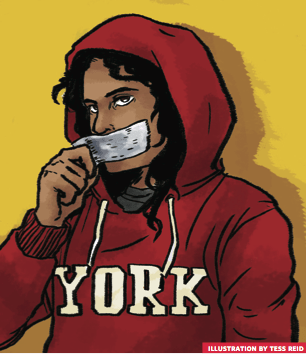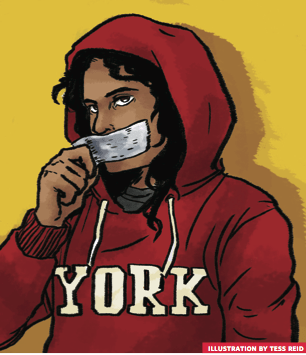
York was rated one of the worst campuses for free speech in a new report by the Justice Centre for Constitutional Freedoms (JCCF). In the JCCF’s 2013 Campus Freedom Index, released on September 24, the York Federation of Students received a failing F for its policies and practices of free speech. York’s administration didn’t fair much better in the report, receiving a D for its policies and practices.
York was not the only campus to receive bad grades. The index measures the level of free speech at Canadian universities using an A – F grading scale. Of 45 universities, 23 earned at least one ‘F’. The report says 51 per cent of campuses studied have censored student expression and free speech.
In giving the YFS a failing grade, they allege the student union has no commitment to campus free speech in its policies, and YFS executives can discriminate against campus clubs on the basis of the club’s beliefs. The JCCF also alleges the YFS’ campus elections rules give election officers power to censor speech during elections or referenda.
Jessica Thyriar?, president of the YFS, says she is surprised by the critique, saying she have never heard of or spoken to a representative from the JCCF.
“The YFS firmly believes in free speech,” Thyriar says.
The JCCF alleges the YFS has “actively discriminated against campus clubs [based] on the club’s beliefs,” citing events that occurred in 2008 and 2010.
The current YFS administration’s practices were not criticized in the report, nor was last year’s.
The JCCF alleges the YFS policies on free speech are too broad and vague, giving YFS officials too much discretionary powers to limit or censor expression.
They noted section 1.8 of the YFS’ Club Ratification Policy, which says “the YFS will not ratify any clubs who threaten, are rude or antagonizing to YFS Staff, Board or Executive Members.”

The JCCF says “rude or antagonizing” gives the YFS “a dangerously broad discretion to refuse ratification to any club that the YFS staff…dislikes or disagree with.”
The YFS ensures there is a safe work environment for all board members and staff members, Thyriar says. Club ratification is done by the clubs committee, she explains, and no one individual can determine that a club is ratified.
JCCF also criticizes Section 10.13.c of the Bylaws, which allows the Chief Returning Officer and YFS officials to “censor speech during elections due to vague language,” according to the report.The bylaw says “candidates shall campaign in accordance with the rules of fair play. Breaking the rules of fair play include, but are not limited to, breaching generally accepted community standards…and misrepresentation of fact.”
The JCCF says what constitutes “generally accepted community standard” is unclear. Thyriar says the policy is not vague, saying the YFS wants “to ensure that elections are done fairly…where all students participating in the elections feel safe.” THE YFS’s referendum policies also came under attack in the report.
Currently only one registered advocating committee can advertise, post or distribute any material supporting or opposing a referendum question, limiting student participation in a referendum campaign in Bylaw 11.4. This bylaw allows YFS to censor students expressing their own reasons for voting “yes” or “no” in a referendum, according to the JCCF.
The official committees have a “monopoly on debate,” the report alleges, and the YFS assumes there is only one reason to vote “no” or “yes,” when there could be a many perspectives on a referendum.
“The policy is designed this way to ensure that all parties participating in the referendum process follow the guidelines as established in the referendum process,” Thyriar says.
York’s administration came under fire for its policies and practices in the report as well. The JCCF criticized York’s policies of making student groups hosting events pay the cost of providing security, as deemed necessary by the university.
Steve Dranitsaris, senior executive officer, Office of the Vice-President Finance and Administration, says the York Security Services works with event organizers to judge if security is needed at the events. The assessment is based on many criteria, Dranitsaris says, such as whether a protest is anticipated.
Security is “an assumed expense of the event for the organizers,” Dranitsaris says, and clubs are made aware of this expense during the club’s registration and orientation. The policy is also on the Temporary Use of University Space web site and the TUUS Office offers drop-in sessions twice weekly to answer any questions, Dranitsaris explains.
Dranitsaris notes that York does not charge student groups for the use of space, unlike the University of Toronto. The JCCF gave York a D instead of failing them because of a stated commitment to expression in their Academic Plan 2010-2015 and their Code of Student Rights and Responsibilities. The JCCF also noted York’s support of pro-life clubs after the YFS voted to deny pro-life clubs recognition in 2008.
The JCCF did criticize York administrators revoking the club status of “Students Against Israeli Apartheid” (SAIA), banning SAIA from re-applying until January 2014, and sending warning letters to the York University Black Students’ Alliance and the Middle Eastern Students’ Association because of their involvement.
Joanne Rider of York media says York applies its “policies and procedures consistently to all community members.” York’s “policies and processes are designed to protect the core academic focus of our university (eg. limiting disruptions of classes and other academic activity)”.
Rider says York encourages “thoughtful and respectful debate and discourse on any range of issues, and we work with student groups to help facilitate this dialogue.”
The JCCF noted York’s support of academic Daniel Pipes in January 2003. Pipes was to speak at York’s Centre for International and Security Studies when complaints from Middle East Students’ Association and the York University Faculty Association forced the Centre to cancel the talk.
Then-President Lorna Marsden re-invited Pipes to speak on campus despite the complaints.
“York University values freedom of expression, open dialogue, peaceful discussion, being mindful and understanding that this is a university setting, “ Rider says.
Ernest Reid
Senior Staff



